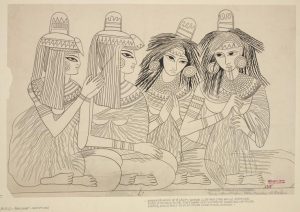As the Olympic Games of 2016 come to an end, one may ponder the origins of such an influential event. It was in 776 B.C.E. when the first Olympic game made its appearance in history. The location is quite interesting on its own, since it was in Olympia, Greece. Olympia is where Greeks would come and honor the gods, and they held several festivals in their honor. The name of the city and game comes from the nearby mountain named Olympos, which was not only the highest mountain in Greece, but it was also once home to the greatest Greek gods and goddesses, according to Greek mythology. The motive for starting such a competition was because Greeks had a deep appreciation for the human body and competition. According to the Greek philosopher Socrates, it is a “disgrace for a man to grow old without ever seeing the beauty and strength in which his body is capable.”1 In addition, the competition provided a platform for establishing a sense of collective identity among the different city-states that competed. Officials and competitors flocked to the events in Olympia, which included foot races, long jumps, boxing, wrestling, and many others. Unlike today’s Games, winners then did not receive gold medals. Instead, olive leave wreaths were given to the winners of the events, and the admiration of their city-states was another plus.2
The games were held every summer, every four years, in Olympia in honor of the mythological god Zeus. The competitors were strictly males from poleis all around the Greek Mediterranean. Those who had the time and money to train and to attend the events were usually from the elite class. For a time women were not only banned from participating in the events, but they were also restricted from watching. One reason for this was that in the boxing and wrestling matches, the contestants were so set on winning that the fights became too bloody to watch.3 In addition to this, the athletes competed covered in olive oil, to emphasize their obsession with the human body. Nevertheless, it was not deemed suitable for women or young audiences to watch. Eventually, after the Greeks saw the influx of people coming in from all parts of the Greek world, they held a festival where only women who were not married could participate. It consisted of mostly foot races and was dedicated to honor the goddess Hera, Zeus’s wife.4

The first and only event for the first thirteen Games was a foot race. Over time, officials added longer and shorter distances to attract more competitors. When more participation from the city-states increased, they added sports such as wresting, the long jump, and discus. Boxing made its appearance not long after in the 18th Olympic Game. One of the rules in the boxing matches was that there was not a time limit or a weight limit, so opponents were essentially chosen at random. Equestrian sports, such as the chariot race, was introduced in 680 B.C.E. Realizing how popular and time consuming the sports had become, officials extended the games to seven days. One reason for this was because the games had more competitions than could be fit in a day or several days. The first day was reserved for honoring the gods in ceremonies, and after the fifth day of competition, the day was reserved to award prizes and to feast.5 To challenge the contestants further, officials added an armored race, which consisted of two grueling laps around the stadium wearing twenty-five pounds of armor. By the end of 580 B.C.E., a whopping fifty events were in motion.
The ancient Olympic Games were very important to the Greeks. Not only did competitors train for years just as athletes do now, but leaders from all around the Greek world journeyed to Olympia for the games. Major leaders from the city-states and beyond went and supported their athletes, while also getting the opportunity to discuss political and economical matters face to face with the other leaders. It was not often that the leaders met face to face. An Olympic truce was called upon athletes and spectators during the games in order to ensure that it was the main concern. Truce bearers traveled to each participating Greek polis and ordered them not to engage in any warfare during the games. 6 One reason for this was that Greeks rarely agreed on anything political or economical, so the truce forced them to oblige. Bringing home a champion from the games was considered a very high and honorable award. It brought prestige and pride to their polis, and it connected them to each other in a way nothing else could. Athletes did not compete for the prizes they won; they competed for the fame and glory of being the victor.
Despite all of its glory and fame, the last Olympic game was held in 393 C.E. when Emperor Theodosius banned the games by claiming they were “pagan acts.” 7 Twelve glorious centuries of the games inspired many aspects of life in Greece from religion to literature. Literature and sculpting competitions were a part of the Olympic games, and it gave many artists a platform to debut their talents to larger audiences. Religion in ancient Greece was devoted to the worship of mythological gods and goddesses, and so the games became extensions of their religious practices honoring their mythological gods. It took 1500 years for the games to be revived again after 393 C.E. After the reestablishment of the games it was evident that the motives remain the same in appreciating the marvels of the human body and competition.
- Tom Griffith, Essential Thinkers – Socrates (New York: Barnes & Noble Books, 2004), 128. ↵
- Jerry Bentley, Herbert Ziegler, and Heather Streets Salter, Traditions & Encounters: A Brief Global History Volume 1, 4 edition (New York: McGraw-Hill Education, 2015), 144. ↵
- Judith Swaddling, The Ancient Olympic Games, Second Edition (Austin: University of Texas Press, 2000), 78. ↵
- Swaddling, The Ancient Olympic Games, 43. ↵
- Swaddling, The Ancient Olympic Games, 53. ↵
- Swaddling, The Ancient Olympic Games, 11. ↵
- Salem Press Encyclopedia, January 2015, s.v. “Olympic Games in the Ancient World,” by Thomas J. Sienkewicz. ↵



84 comments
Luke Trevino
Wow great, informative article! You can tell this article is every well researched and a lot of time was put into it! I personally love the olympics and never truly knew the origins. I had known it started in Greece but never knew it was banned at one point in Greek history. It is amazing how it started with very little events to all the events they have today! Overall very good article!
Johnanthony Hernandez
Great article, it’s interesting to see how far the Olympic games have come from what they originally were. I’ve never been much for the Olympics, but I would have like to see them in their original form. Because I’m not much for them I didn’t know much about them, but this article really did cover the most important parts, like I didn’t know that for about 1500 years or that they were outlawed for being a “pagan act.” But overall a great and informative article.
Natalia Zuniga
It is fascinating to see that the need of competition has always been around and that people always found ways to compete.I hadn’t known that the games had started and continued for a while with only one event, which would be today’s track and field. Also great to see that the games were made to truly done to honor the God and the human body.
Mario De Leon
I have always been very interested in the Olympic games and how they were able to bring people from all around the world together. I did not know the origins of the games were to appreciate the abilities of the human body. I found it interesting that we still use the tradition of holding the games every four years. It is also very impressive that the Olympic games could bring temporary peace to the participating Greek polis.
Aaron Mcglown
This is a well organized and well researched article. Being on the basketball team here at STMU I love to follow the Olympics. I knew a little about the Olympics but never knew it all started with a race. Also, never knew there were so many more events. Hopefully we can continue this outstanding tradition and bring back a few events.
Aaron Jaramillo
Well done on this article. I knew about the olympics and where it all originated from. however, I didn’t know it all started with a race. Hopefully the next Olympics can bring back more events like there was many centuries ago.
Maalik Stansbury
I just think this is an egotistical article, just showing how the greeks were so narcissistic that they created things and ways of life to make themselves even more narcissistic. I like the article, it kept me intrigued as to why and how they made these games. But come on there could have been a better reason as to why to create games other than humanity being selfish.
Diana Moreno-Gutierrez
This was a very interesting article, I think it is great that we have been able to continue this great tradition that has grown tremendously since its origin. I think its a shame that the women weren’t allowed to watch the Olympic games such as the wrestling and boxing due to the violence, but now we have women like Ronda Rousey that get into more violent fights than the men. The Greek were also very nationalistic, and I can imagine just how intense the matches would get. Great job!
Rachel White
I liked how you made this article relevant to the Olympics that we hold today and to give reader’s an idea of why we do hold this tradition after all this time. I knew very little about the Ancient Greek Olympic Games before reading this article and found it very interesting that at first, it was solely foot races and then they expanded foot races to gain more competitors. It is crazy how much this has evolved into the Olympics we are familiar with today. Very interesting topic and I had fun reading this.
Jezel Luna
I had no prior knowledge about the ancient Olympic games, but throughout this article, I was able to retain so much information. I was unaware that it began so early in history and started off as simple as a foot race. It was very disappointing to read that women were actually banned from participating or even watching. However, I was amazed that they were not even receiving awards just recognition but that was the glory that satisfied them. Very informative and interesting article!